Are You Being 'Phubbed'? Cell Phone Use Could Be Ruining Relationships, Leading To Higher Rates Of Depression

Cell phone use while a partner is present is almost as ubiquitous as "Netflix and chill" in a relationship. One partner casually takes out their phone to check out social media updates or to laugh at the latest viral video. It seems harmless, but the action could adversely affect a relationship, according to a new study. The researchers have even coined a term -- "phubbing," or phone snubbing -- to describe the phenomenon.
The study, led by researchers from Baylor University, was published this week in the journal Computers in Human Behavior. The researchers wanted to determine the effect of partner phone snubbing -- pphubbing -- on the relationship and the emotional state of the involved partners. Two surveys were conducted as part of the study. The first identified phubbing behaviors using a nine-item scale. The second analyzed the effect of phubbing on the relationship.
“In everyday interactions with significant others, people often assume that momentary distractions by their cell phones are not a big deal,” Dr. Meredith David, assistant professor of marketing at Baylor, said in a statement. “However, our findings suggest that the more often a couple’s time spent together is interrupted by one individual attending to his/her cell phone, the less likely it is that the other individual is satisfied in the overall relationship."
A partner checking their cell phone during a lull in conversation or holding it while with their partner were examples of phubbing behaviors. In the second survey, 46.2 percent of the 145 adults surveyed said they had been phubbed. Of those surveyed, 36.6 reported periods of depression. Phubbing could lead to lower relationship satisfaction, which could affect overall life satisfaction, according to the researchers.
"Thus, when spending time with one’s significant other, we encourage individuals to be cognizant of the interruptions caused by their cell phones, as these may well be harmful to their relationship," David said.
The idea of a digital, or cellular, divide is not new, but it's one that's hotly debated. Sherry Turkle, an MIT professor, wrote in the New York Times' Sunday Review about how cell phones are making people antisocial. Claude S. Fischer, a sociology professor at the University of California, Berkeley, disagrees with Turkle. "That social difference is likely to be a complex mix of new habits -- many only now jelling -- and a complex mix of the good, the bad, and the just different," Fischer wrote in Boston Review.
© Copyright IBTimes 2024. All rights reserved.



















